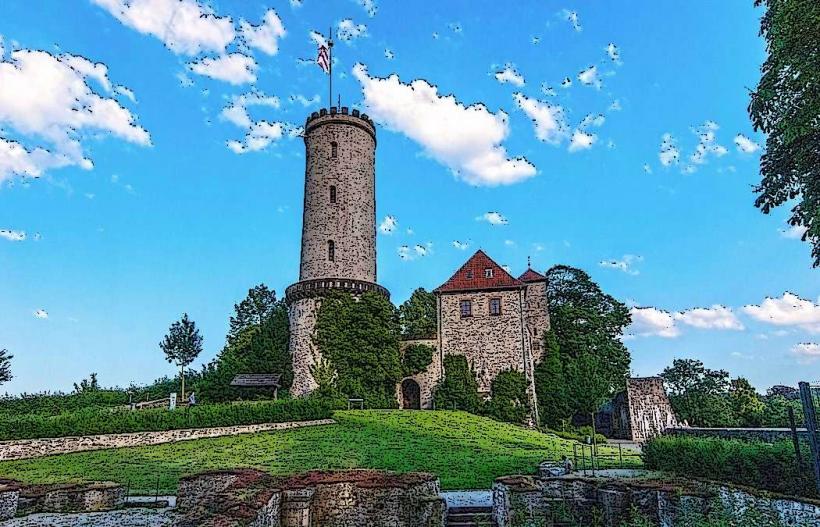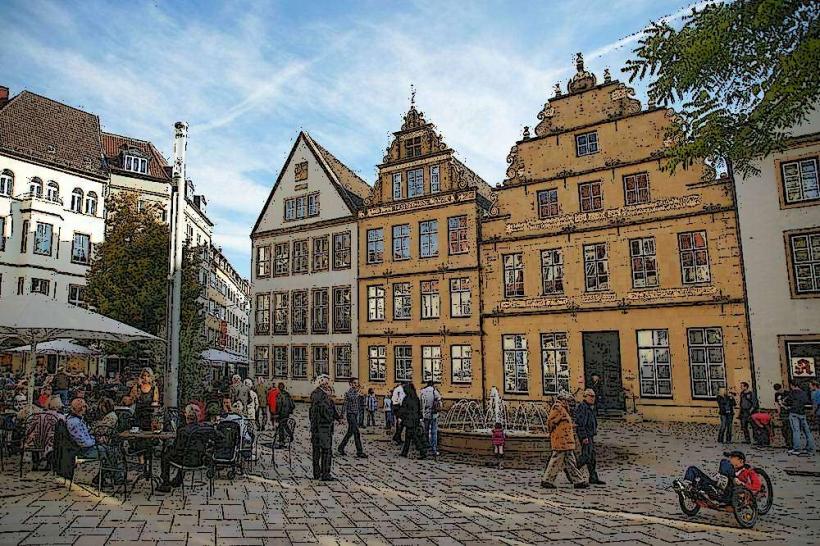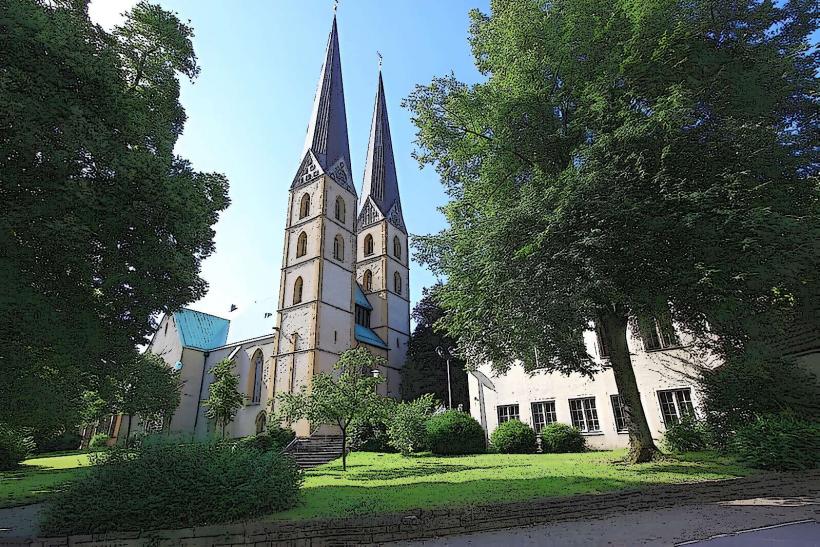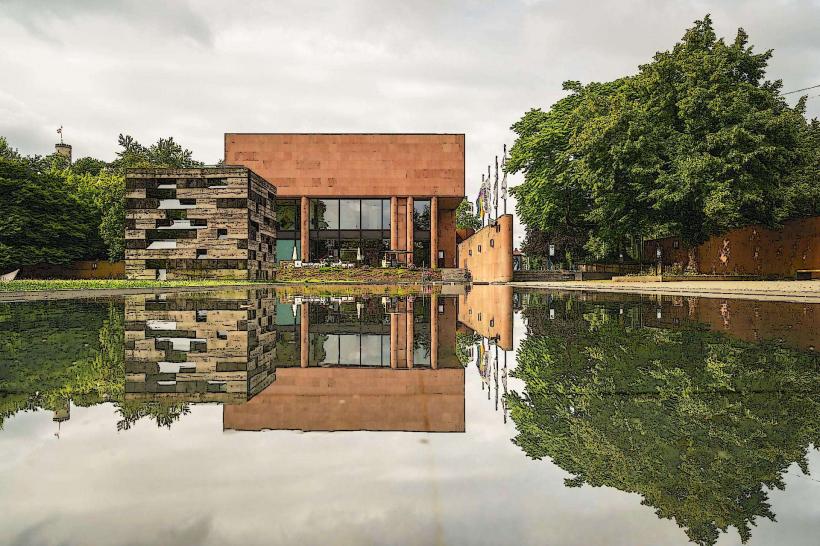Information
City: BielefeldCountry: Germany
Continent: Europe
Bielefeld is a city in the northeastern part of North Rhine-Westphalia, Germany. Often considered a city of contradictions, Bielefeld is known for its strong industrial roots, modern amenities, and green spaces, alongside a bit of playful mystery—due to a popular urban legend that suggests it doesn't exist! Despite this humorous myth, Bielefeld is a vibrant and well-established city with a rich history, cultural heritage, and an increasingly modern economy.
1. Historical Background
- Founding and Early History: Bielefeld was founded in the 13th century by Count Bernhard IV of the House of Lippe. Initially a small market town, the city grew due to its location along trade routes, benefiting from its position near the Teutoburg Forest and the Weser River. In the Middle Ages, Bielefeld became a regional center for trade and commerce, and it developed into a significant town in the Duchy of Westphalia.
- Industrial Growth: During the 19th century, Bielefeld became an industrial center, particularly in the textile sector. The city gained prominence for its textile factories and the production of fabrics such as wool, linen, and cotton. The German Industrial Revolution saw the rise of major companies, and many of Bielefeld's key industries, such as machinery and food production, were born during this period.
- Modern Era: Today, Bielefeld is a thriving, modern city that is home to major companies and industries, including global players like Dr. Oetker (a leading food manufacturer) and Miele (high-end home appliances). The city combines its industrial heritage with a strong focus on technology, research, and development.
2. Cultural and Historical Sites
- Sparrenburg Castle: The Sparrenburg Castle is one of Bielefeld's most iconic landmarks. Located atop a hill, the castle dates back to the 13th century and offers stunning panoramic views of the city. Visitors can explore the castle’s ramparts, towers, and underground passages. The castle hosts various cultural events, such as medieval festivals and concerts.
- Altstadtrathaus (Old Town Hall): The Old Town Hall in Bielefeld is a charming historical building that dates back to the 16th century. Located in the heart of the Old Town, it features Renaissance architecture and has served as the seat of municipal government for centuries. The square around the town hall is a popular place for locals and tourists to gather.
- St. Mary's Church (Sankt Marienkirche): This beautiful Gothic-style church is located in the city center and is known for its impressive architecture, particularly the large, ornate altar and stunning stained-glass windows. It has played a central role in Bielefeld’s religious history.
- Historisches Museum (Historical Museum): The Bielefeld Historical Museum offers a detailed look into the city’s past, from its medieval origins through to its industrial growth and modern era. The museum’s exhibits cover a variety of topics, including local history, art, and culture.
3. The Bielefeld Conspiracy
- The Myth: One of the most famous aspects of Bielefeld is the Bielefeld Conspiracy, a tongue-in-cheek urban legend suggesting that the city does not actually exist and is a fabrication by a vast conspiracy. The myth was first proposed in 1994 and has become a quirky part of Bielefeld’s identity, with locals and visitors alike embracing the joke. While the legend is clearly fictional, it has provided a sense of humor and camaraderie for the residents, and it continues to be a fun talking point.
- Conspiracy Humor: The city itself plays along with the myth, with "evidence" of the conspiracy appearing in the form of posters, social media campaigns, and jokes that humorously suggest that the city's existence is part of an elaborate ruse.
4. Modern Economy and Innovation
- Technology and Research: Bielefeld is a hub for research and innovation, with a strong emphasis on fields such as technology, medicine, and education. The Bielefeld University (Universität Bielefeld), founded in 1969, is known for its interdisciplinary approach to research, particularly in the fields of social sciences, mathematics, and computer science.
- Key Industries: Bielefeld is home to several major industries, including textile manufacturing, automotive components, and food production. The city is also known for Miele, a world leader in high-end home appliances. Additionally, companies in the IT, research, and logistics sectors have contributed to the city's growing economic diversification.
- Dr. Oetker: One of the most famous companies based in Bielefeld is Dr. Oetker, a global food manufacturer specializing in baking ingredients, frozen pizza, and desserts. The company was founded in Bielefeld in 1891 and remains an important part of the city's identity.
5. Parks and Green Spaces
- Botanischer Garten (Botanical Garden): Bielefeld’s Botanical Garden is a peaceful space that offers visitors a chance to explore a wide variety of plants and flowers. Located near the city’s Sparrenburg Castle, the garden is a lovely place for a stroll or a relaxing afternoon amidst nature.
- Teutoburg Forest: The Teutoburg Forest lies just outside Bielefeld and offers beautiful hiking trails, scenic views, and rich natural history. The forest is home to a variety of wildlife, and it is a popular destination for outdoor activities like hiking, biking, and birdwatching.
- Obersee Lake: The Obersee is a serene lake located within the city limits. It is surrounded by walking paths and parks, making it a lovely location for picnics, jogging, or simply relaxing by the water.
6. Cultural and Arts Scene
- Theater Bielefeld: Theater Bielefeld is the city’s main theater and offers a range of performances, from classical plays to modern theater and experimental performances. The theater also hosts musical performances, ballet, and opera, making it a key venue for arts and culture in the region.
- Kunsthalle Bielefeld: The Kunsthalle Bielefeld is an art museum that is home to a significant collection of modern art. The museum’s exhibitions span a variety of styles, including expressionism, abstract art, and contemporary art. The museum regularly hosts temporary exhibitions featuring international artists.
- Music and Festivals: Bielefeld has a lively music scene, with regular concerts, festivals, and performances throughout the year. The Bielefeld Jazz Festival and the Bielefeld Opera Festival are among the most notable cultural events in the city. Additionally, the city hosts several music venues and clubs, offering diverse genres from classical to electronic music.
7. Shopping and Dining
- Altstadt Shopping: The historic center of Bielefeld (Altstadt) offers a variety of local shops, cafes, and boutiques. Visitors can enjoy shopping for handmade crafts, clothing, and local specialties in a picturesque setting.
- City Center: The City Center features modern shopping malls such as LAGO Shopping-Center, which houses both international and local brands. The shopping district also has plenty of cafes and restaurants serving both local and international cuisine.
- Local Cuisine: Bielefeld offers a variety of German dishes, including Sauerbraten (marinated beef), Wurst (sausage), and Pumpernickel (dark rye bread). The city also boasts a number of craft beer breweries, and many local establishments serve regional specialties.
8. Transportation and Accessibility
- Public Transport: Bielefeld is well-connected by public transport, including buses and trains. The city’s central station (Bielefeld Hauptbahnhof) is a major hub for regional and long-distance trains, making it easy to access nearby cities like Hannover, Dortmund, and Cologne.
- Cycling: Bielefeld is a bicycle-friendly city with an extensive network of bike paths and bike-sharing programs. The city is great for cycling enthusiasts, with numerous routes through its parks and along the Teutoburg Forest.
- Air Travel: The nearest major airport is Paderborn/Lippstadt Airport, about a 45-minute drive from Bielefeld. For international flights, Düsseldorf Airport and Cologne Bonn Airport are also accessible by train.
9. Festivals and Events
- Bielefeld Christmas Market: Bielefeld’s Christmas market is a festive event that takes place every December in the historic city center. The market features traditional wooden stalls selling crafts, food, and mulled wine, creating a magical winter atmosphere.
- Bielefeld International Film Festival: The Bielefeld Film Festival is a well-known cultural event that showcases independent films, including international cinema and works by emerging filmmakers. The festival also offers discussions, workshops, and screenings for a diverse audience.
10. Conclusion
Bielefeld is a dynamic city that combines a rich history with a modern, thriving economy. Its cultural scene, historical landmarks, and proximity to nature make it an attractive destination for both locals and visitors. Whether exploring medieval castles, enjoying contemporary art, or indulging in local food and shopping, Bielefeld offers a variety of experiences that appeal to different interests. And while the Bielefeld Conspiracy adds an element of humor and intrigue, the city itself remains a vibrant and welcoming place to visit.





